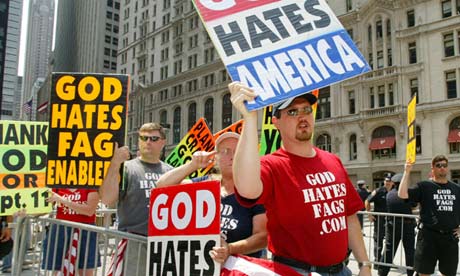
Could you stand to be hated by every stranger who caught sight of you? To be condemned by the media and see members of your family physically and verbally abused? It would be unendurable. Now imagine not only being able to bear it, but welcoming it. Seeing it as confirmation that you were doing everything right.
If that sounds like a drastic distortion of normal psychology, it isn't. Rather, it's the result of manipulating perfectly ordinary impulses and needs: to be loved and supported, to be admired by your peers and elders, to feel safe. That, in any case, is how Westboro baptist church in Kansas turns everyday people into firebrands.
Presided over by elderly preacher Fred Phelps, it consists mainly of his own family and a few others who have been drawn into his ministry over the years. The church's members, who are Calvinists, believe that everyone has already been assigned to either heaven or hell. They are not out to win souls: their only task is to bear witness. You wouldn't expect sinners to enjoy being reminded that they are doing wrong, so being hated is a mark of success – of prophethood, in fact.
Beyond its basic theology, which is not new, and not especially unusual, the church has a few more idiosyncratic preoccupations. It believes that divine wrath has been largely written out of modern Christianity, but that God is still provoked by sin and just as likely to visit destruction on Manhattan and New Orleans as he was on Sodom and Gomorrah. And what does God hate most? God hates "fags". The thought has become an obsession, the obsession a slogan. One that has made Westboro baptist church, picketer of the murder trial of young gay man Matthew Shepard, and of the funerals of "fag troops" returning from Iraq, infamous.
It was into this world that Lauren Drain was brought by her father Steve, aged 14. If there is a villain in this memoir, written a few years after its author was ejected from the church, it is not Phelps but this petty patriarch. A student for much of Drain's childhood, flip-flopping between philosophy and filmmaking, atheism and religious mania, Steve decided to make a documentary exposing Westboro, Hatemongers, in 2000 (Louis Theroux had the same idea a few years later). But following a well-worn personal pattern, he ended up falling for the church, and decided to move his family to Kansas following an invitation from Phelps's charismatic daughter, Shirley Phelps-Roper.
For some time, Steve had been preoccupied by the moral conduct of his daughter. She is a "whore" and a "little bitch" for flirting with a boy at school. He pushes and hits her, scares her so much that she calls child protection services. Yet still she loves him and yearns for his approval. She wields the signs: "You are going to hell", "Fags are beasts", "Thank God for 9/11". A shy teenager must have some fairly compelling reasons to expose herself to total ridicule in public. Those reasons, a desire to share in something her father believes in, to be a "good girl" for him, multiply as the life of the church envelops her. All her adult role models see the pickets as essential work. Phelps's values, extraordinary as they seem to the rest of us, become second nature.
Westboro's members are not asked to reject modern life, to eschew popular culture or protect their children from the evil influence of the media. They are deliberately exposed to it, their ability to resist temptation a sign of their faith. In this they are different from closed sects like the old order Amish. Members hold down normal jobs; younger ones are expected to keep up with current affairs; they play Xbox; they go to normal schools and colleges (Drain even pickets her own high school graduation, before running into the auditorium to receive her certificate). They listen to Lady Gaga, Adele and Rick James (though they rewrite the lyrics to include dire warnings of hellfire, with bizarre results: "She's a burning freak, burning freak! She's extra crispy now").
What this means is that so long as the church provides all a person's support systems, its hold is strong. But as soon as there's a link to the outside world, things can unravel pretty quickly. Drain's route out was using an online instant messenger to talk to a boy. The sin was enough for her to be expelled not only from the church but her family too. Others, including Phelps's own grandchildren, have followed her. The Westboro baptists are dwindling.
Drain's memoir is useful because, unlike Theroux's two documentaries, it allows us to get beyond mere incredulity. It exposes the internal logic of the church, judged according to which it is neither extreme nor insane. If you believed utterly in the reality of hell, that homosexuality was the gravest sin, and that death and destruction occurred on Earth because of God's anger, you might well behave like Phelps's acolytes. But, ultimately, the church's "teachings" are simply his own psychology writ large. From time to time they happen to match the needs of others, like the aimless yet controlling Steve Drain. But their appeal is limited, to say the least.
Lauren Drain was unlucky to have found herself in the orbit of a family that set itself so determinedly against the rest of the world. Her questioning nature made it almost inevitable that she would leave, and as the church gets smaller, staying the course will become harder and harder for those who remain. Its particular message and modes of action, shaped so much by his personal prejudices, are unlikely to endure long beyond Phelps's death. It will collapse under the weight of the demands it makes of its own members, having flourished briefly and grotesquely, like a cancer.

